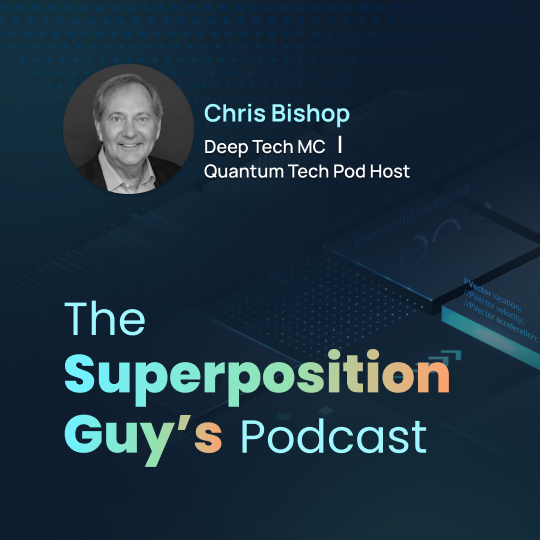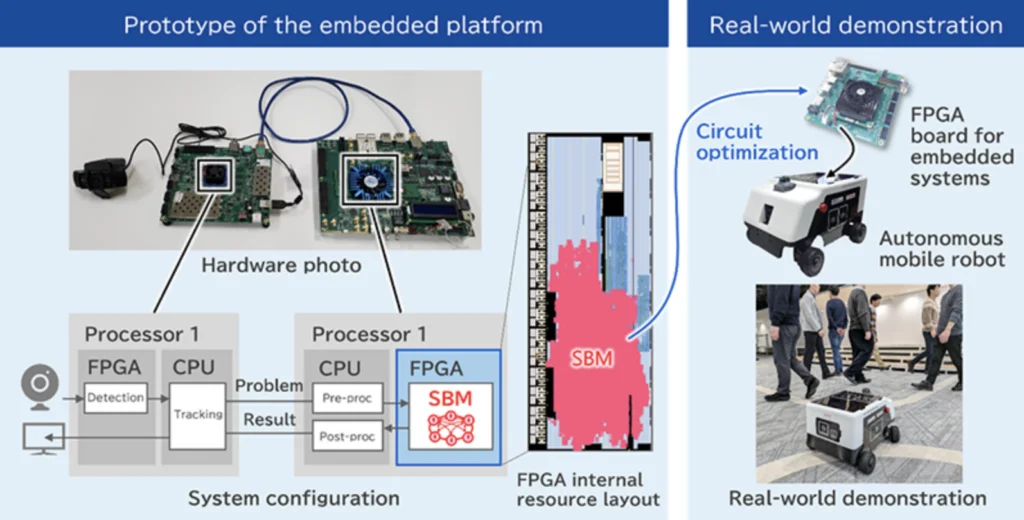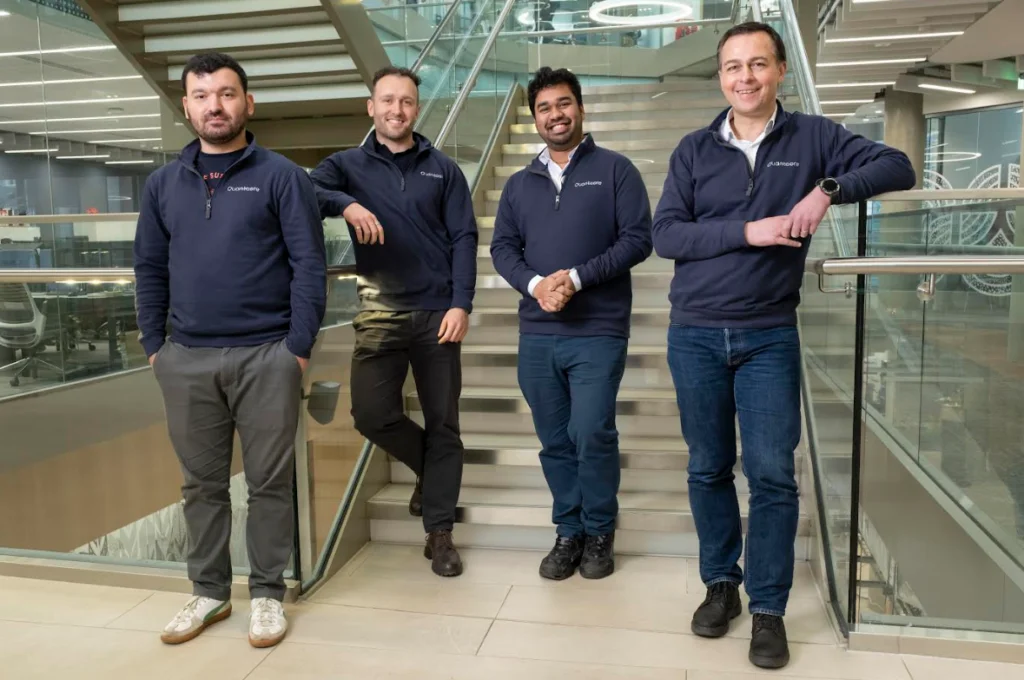“The Superposition Guy’s Podcast”, hosted by Yuval Boger, CCO at QuEra Computing

Chris Bishop, a non-linear multimodal careerist and former musician, discusses his diverse career journey from music to technology on Yuval Boger’s podcast. He highlights his experiences as a studio musician, web producer, and IBM employee, transitioning into quantum technologies where he now engages as a freelance consultant, writer, and podcast host. Chris shares insights from hosting and emceeing quantum tech events, emphasizing the significance of adapting to emerging tech fields and the importance of interdisciplinary skills in navigating future careers.
Listen on Spotify — here

Full Transcript
Yuval Boger: Hello Chris and thank you for joining me today.
Chris Bishop: Well, thank you for inviting me Yuval, I’m delighted to be here.
Yuval: So who are you and what do you do?
Chris: Well, so, I’m Christopher Bishop, I’m a non-linear multimodal careerist. I’ve had eight careers so far in the 50 years since I graduated from Bennington College with a degree in German Literature. I also studied music, I played a lot of different kinds of music and I actually did it for a living for 20 years.
Right after college I got a gig touring with a country rock band called McKendree Spring. Probably listeners’ parents might have heard of that band. I did three albums with them, toured all over the US and Canada and Europe. Opened for the Eagles, ZZ Top, Fleetwood Mac, Linda Ronstadt, Return to Forever, Weather Report. It was like a real gig.
And then ended up as a studio musician in New York when the band broke up. Then got into the jingle business to sleep in my own bed at night, wrote a lot of music for TV commercials. Became intrigued by the web in the early 90s, taught myself to be a web producer, worked at a couple of seminal agencies in New York.
And then much to my surprise was hired by IBM into corporate internet programs in the late 90s and worked there for 15 years. I e-tired about 10 years ago. That’s big blue parlance for leaving the company. And I’ve been working as a freelance consultant, writer, speaker. Probably your listeners know me as the host of the Quantum Tech Pod. Also as an emcee at various quantum events sponsored by The Economist, by Quantum.Tech.
I was just in London at an Evident AI symposium talking about quantum and banking. And I still play. I’m fronting a band called Ion Maiden. We did a gig in DC at the Quantum Tech event. So, that’s who I am.
Yuval: And the band has other quantum luminaries, right?
Chris: It does for sure. So the lead guitar player I would say is, with all due respect to Sergio, is Peter Bordow. Who looks like Greg Allman and plays like Johnny Winter and is the SVP of Quantum and Crypto Security at Wells Fargo Bank. Amazing.
And then the rhythm guitar player is Sergio Gago who is the head of Quantum from Moody’s Analytics. Again a brilliant guy. And plays more like Eric Clapton. And on keyboards we have a woman named Marlou Slot. She’s a PhD in physics. And she works at NIST, the National Institute of Standards and Technology. She played keyboards and sang. And our drummer was a student from University of Maryland who is doing a double major in music and physics. Perfect.
Yuval: That’s very exciting.
Chris: Yeah.
Yuval: And the recordings, some recordings are available, right? The clip here and the clip there.
Chris: Yeah, there are some that people made on their phones. We’re still sort of debating how and where to promote them, if you will. I think probably on YouTube at some point. And there’s talk of maybe doing a return engagement at the Quantum.Tech event in London, at the Twickenham Stadium at the end of September. Still sort of an open conversation but I’m hoping we do play again.
Yuval: Do you rehearse or is it a real-time error correction?
Chris: Good question. Actually we did it all kind of remotely, picking tunes and picking keys and all that. But we did have a two-hour rehearsal the night before. I booked a studio in Washington, D.C. and we all got together. Sergio, to his credit, put together versions of the tunes and the keys that I was going to sing them in.
And posted them on Spotify so we could all listen to what the book was going to be and what the repertoire was going to happen or turn out to be.
Yuval: So you’re an emcee in many quantum events. What is the most unusual thing that happened as an emcee? Or is it all kind of perfectly scripted, boring, everyone knows the questions and the answers?
Chris: Well I think the challenge is putting together questions that elicit interesting responses that are speaker specific, if you will. So finding a way to let the panelists, in this case, share their expertise and their unique perspective.
There was one incident recently where, I think it was in D.C. actually, asking a panelist some kind of question and the person refused to answer. It was like, “Well, I don’t know.” Or, “I don’t have an answer to that question.” Which was kind of frustrating. It was like, “Make something up. I mean, you know, conjure something. It won’t be on the test. No one will bust you.”
But it’s always interesting that people are always fascinating and smart and coming from a wide range of backgrounds. So, germane to my background, having gotten into quantum about five years ago, pretty much all of the people that you and I meet and speak to and interview and whatever have been doing other things and ended up in quantum through various, often circuitous routes.
I would say that this generation of college students probably is the first one that’s going to actually go into a quantum job at a quantum company. Before that, we all did lots of other kinds of things and found our way into the quantum space through various paths.
Yuval: So, in a way, that previous generation, not the existing generation of students, but the previous one was preparing for a job that maybe didn’t exist at that time. And I think that is one of your many passions these days.
Chris: Yes, it is. I do workshops typically in university settings called “How to Succeed at Jobs That Don’t Exist Yet.” And it’s based on a codification of how I navigated these eight careers and what the common sort of techniques or processes or teachable moments were over these many years.
So, yeah, I’ve done it at many universities in the U.S., including Columbia and NYU Stern and Georgetown and Duke and Texas A&M. I spent a couple of weeks in March in London doing it at the London School of Economics, Royal Holloway, as well as the Institute of Physics and the National Physical Laboratory.
The message, though, is that quantum certainly qualifies as an area where there are jobs that didn’t exist until maybe two years ago, five years ago. And it’s a growing space, so again, I would encourage listeners interested in this space to explore.
And the other thing I would say, the additional qualifier, is that there are many opportunities to work in quantum that don’t require a Ph.D. in physics or in mechanical engineering or electrical engineering or software.
These are businesses at the end of the day, so they’re trying to drive attributable revenue and please Wall Street if they’re publicly traded or shareholders and investors if they’re not. So I would encourage listeners, again, if you have skills in a range of disciplines from business development to UX design to PR and comms. Many people are interested in having policy and regulatory conversations. So, again, jobs that didn’t exist, how do you talk to a client about quantum and how it’s going to drive business value for them? That’s an exciting opportunity if you’re into sales and tech.
Yuval: So give us the Cliff Notes. How do I prepare for a job or how do I succeed for a job that doesn’t exist?
Chris: So I think, with all lack of modesty, it’s not brain surgery. I think there’s a lot of pattern matching and lessons from history that we can learn. I would quote Stephanie Simmons, the chief quantum officer at Photonic. Her contention is, “All human progress has been driven by the commercialization of physics.”
So I don’t know that it’s all that. I mean, it’s certainly biology and chemistry and mathematics, and other aspects of science. But the idea is technology always drives careers and jobs with skill requirements.
And it’s been going on since we were wandering around in the Pleistocene wilderness thousands of years ago where the technology was a long stick with a sharp end. And people who know how to use that technology were the ones that survived. They could kill or capture something to eat and use for clothing.
And that pattern has been going on again right through the invention of the steam engine for the railroad or mechanized knitting machines or, you know, to today’s technologies like social media and AI and robotics and quantum. So the meta concepts of new jobs, new careers, and jobs that don’t exist yet are occurring at the intersection of historically or traditionally disconnected disciplines.
And that’s where we need to look. So again, as I said before, biz, dev and quantum. Nobody was selling quantum solutions to businesses five years ago. That wasn’t a job. That’s a job now. You know, crypto assets strategist. That wasn’t a job.
There’s lots of 3D printing. They’re looking to 3D print organs and lungs and vascular tissue. That wasn’t a job five years ago. So the idea of looking for where technologies connect and drive new models is where the sort of new career nebula exists.
Yuval: The upside is that there are not a lot of people with that experience. I mean, I remember working in cybersecurity a couple of years ago, and the problem was that everyone around me had 20 years of cybersecurity experience. So they didn’t want to listen to the new guy. But when you talk about business development and quantum, well, it’s a relatively green field. Would you agree?
Chris: Yes, absolutely. And the other examples I like to cite are something I call nanopharmacy, for example. So again, stepping away from quantum for a moment, although quantum will certainly influence how this gets developed. There are doctors at UC Berkeley and in other settings developing something called neural dust. It’s a grain of rice-sized device that you can implant that captures data about your physiology.
They’re also developing nanobots that you can inject with pharmacology or medicine that’ll go directly to the tumor or the wound or whatever. Personalized medicine that was never able to be delivered before. And the corollary is the three chemists who won the Nobel Prize several years ago won it for creating nanomachines, building mechanical devices at 10 to the minus nine.
So the idea is to have someone with a degree in mechanical engineering at the nanoscale and someone who understands pharmacology and medicine. Medical delivery is, say, the molecular or even atomic level are going to be combining to create nanopharmacy solutions for patients.
Yuval: I would guess the first step in preparing for such a job that doesn’t exist yet is identifying the area. So let’s hypothetically assume that I identified quantum pharmacy as one of the areas that’s going to be very big. What do I do next?
Chris: So I have what I call my future career toolkit. Worth mentioning to you, Yuval, that I have actually signed a publishing deal with a small company called Morgan James. And they’re going to publish my book. I’ve written a book about this called Improvising Careers. And it’s going to be coming up probably next spring, to be honest. The publishing cycle is long.
But the tools are voice, antenna, and mesh. Voice is an ideation exercise to identify where you have proclivities or interests using triggers like what’s your favorite game, TV show, book, movie. The second tool is antenna, which is what you were describing, what you’re asking about, how do you find out? You put together a protocol for identifying where conversations are going on around, in this case, quantum chemistry.
Where are people talking about that? Track down the sources. Is it blogs? Is it corporate websites? There’s lots of ways to find these kinds of conversations. Is it courseware? Is there something on Udacity or Udemy or edX? And then the third tool is mesh, which involves using LinkedIn or other tools to find who the actual people or companies are that are leading these conversations.
My contention, we’re both musicians, right? So my contention is there’s always a Miles Davis at the head of every discipline. There’s a Fritz Kreisler. There’s a Serena Williams. There’s a Tony Hawk. There’s a Taylor Swift. There’s always someone at the top of whatever function it is leading the way and providing insight and guidance and visionary aspirational perspectives on where this discipline is going to be.
And the implications are what the jobs might be, what the skills required might be.
Yuval: But then if I identified Miles Davis or Taylor Swift, how do I get them to talk to me about what jobs they think might be required?
Chris: Well, so you want to follow them. Certainly people at the top of a function like that are hard to reach. But certainly many or most of them are on LinkedIn. Taylor Swift, probably not. But tech leaders for sure, all the savvy ones, have profiles on LinkedIn that either they or their PR or comms teams are populating with content. They’re a content furnace constantly putting in new information about what they’re doing.
You know, executive hires, investment rounds, product launches, partnerships, strategic relationships as a supply chain, whatever. So follow what they do and then track down people with director titles or above, I would say. Find them on LinkedIn. Someone, the implication being they have discretion. They have a hiring manager. They have an HR person who’s working with them to find new talent and make sure that you’re connected to them and that they know who you are.
And as an ancillary, put up content deliverables, work products related to what that company does. If you have a paper you wrote on quantum chemistry, make sure it’s accessible from LinkedIn, either on SlideShare or in a Google doc, however you execute it. Make sure they can see it. So when their HR manager or their hiring manager goes to your profile, they go, oh, well, you know, Bob Smith or Betty Jones published this piece or did a presentation at this event or is co-lead on a research note or whatever. We should definitely get him or her in here and talk to them.
Yuval: So not to inquire about all your trade secrets, but when you did your first MC gig for quantum, you’re not a quantum PhD. So how did you get ready for it? How did it feel to ask all these quantum scientists questions, perhaps being afraid that you wouldn’t understand what they’re saying?
Chris: Well, so based on my 15 years at IBM, a decade and a half in the belly of the beast and in a variety of roles, two stints at corporate headquarters in Armonk, one in HR comms, one in corporate citizenship and corporate affairs. And then a couple of roles out in the line supporting executives with big P&Ls. And by big, I mean with a B. I mean, I supported a couple of people who had a $3 billion target, you know, which is a big number.
But again, in perspective at IBM, that’s kind of a rounding error because that’s a $100 billion company at the time. But the idea is putting together messaging speeches and presentations that connected business and technology. So I kind of had that orientation as a member of the on-demand speakers bureau.
They used to trot me out to client engagements to talk about, you know, e-business portfolio and like that. So I did research. I investigated, I did a lot of reading and exploring to discover what this quantum space was and who was doing it and why they were doing it and what they thought the value was and, you know, what the range of options was.
I mean, it’s, you know, as we know, it’s computing, it’s clocks and sensors, it’s networking, it’s cybersecurity. Then learning about all the various qubit modalities, what that landscape looks like. So I sort of know enough to be able to ask questions about business and that’s where I bridge the proverbial gap. I don’t get into what we used to call it IBM speeds and feeds down into the technical details of how it works.
But like what, you know, what is the value of this technology? How is it going to transform how we live and work?
Yuval: As you think about the past year in quantum, what surprised you the most other than that some of the people can actually play guitar or keys or sing?
Chris: Or violin, in your case. I think it was interesting to see sensors rise above the mayhem to some degree. And the other aspect is cybersecurity. So an exciting aspect of quantum this year has been the increased focus, for better or for worse, on the harvest now decrypt later threat.
The Y2Q or Q day or whatever has pulled the conversation about quantum from being somewhat of a backroom R&D IT conversation to now a board level issue. Companies have to figure out what their strategy is for identifying their cryptographic landscape and how to protect their mission critical data.
So I think that’s great. I mean, it’s scary and it hopefully can generate revenue for some of these quantum companies. I won’t necessarily name names. I don’t want to promote anybody specifically, but there are several companies that are focused on this space doing really great work.
The other area is around sensors. So some breakthroughs like what Cerca Magnetics has done with creating a 3D printable wearable headset using quantum sensors and their initial instantiation to detect childhood epilepsy. So fantastic. What an amazing breakthrough that is. Real world benefit today that is funded. Actually, they got a round and they’re developing and financing this technology. So those are exciting things I think that are happening. Quantum computing, with all due respect, it’s probably five years off from really being viable and broadly applied. But exciting to watch it all morph and change and evolve. Fantastic.
The brilliant people all over the world trying to figure this out. Which modality will do what and what benefit will it bring? And it’s exciting.
Yuval: So if you think about these brilliant people, let me ask you a hypothetical. If you could have dinner with one of them, one of the quantum greats dead or alive, who would that person be?
Chris: So I’m a fan of historical figures for sure. I was just in Paris and I wandered into the church where Blaise Pascal is interred. A brilliant scientist who invented this device, the Pascaline, to help his dad do addition and subtraction as he was managing taxes in Rouen. Charles Babbage is someone I’d like to have a conversation with.
Sort of scientists in general. Marie Curie, I was at her lab when I was in Paris in the fall. So people like that, not necessarily quantum. But would it be great to sit with Isaac Newton? I’ve heard people claim he was the smartest person who ever lived. What would tea with Isaac be like? It would be interesting for sure.
Yuval: Apple pie.
Chris: Exactly. Apple pie with Isaac. In terms of today, I’ve met and spoken with many of the really smart people again through my podcast and just through being at events, where we’re together.
I’ve had conversations that have been very enlightening and interesting with lots of smart people working in the quantum space. I’m always impressed, always amazed and enamored and fascinated by the kinds of intellect that these people have. Men and women for sure. The brilliant women who are in this space. Fantastic.
Yuval: Wonderful. Chris, thank you so much for joining me today.
Chris: Well, thank you for inviting me, Yuval. I’ve enjoyed our conversation.
To subscribe to the audio podcast, please Spotify here















